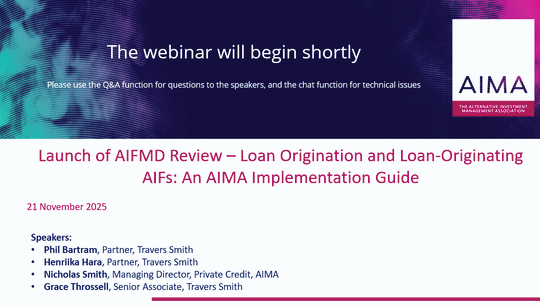CBI updates Q&As on third-party fund management companies
Published: 17 September 2021
In September 2021, the Central Bank of Ireland (CBI) has issued updates to its AIFMD and UCITS Questions and Answers regarding the CBI’s expectations in relation to an AIFM or UCITS management company operating or planning to operate in the manner of a third party management company.
The Q&As confirm that where new business results in a material increase in the nature, scale or complexity of a firm’s business, the CBI deems this to be a material change to the firm’s operating model which requires consultation with the CBI. In these circumstances, management companies are required to engage proactively with CBI supervisors and to ensure that they are appropriately resourced to service the additional business.
See below for revised Q&As. If you have any questions, please contact James Delaney.
AIFMD Q&A 41st Edition – 10th September 2021
ID 1146
Q. I am an AIFM. An AIF I manage is of the view that it no longer meets the criteria of an AIF as per Regulation 5(1) of the AIFM Regulations. Am I required to engage with the Central Bank?
A. Yes. The Central Bank expects that such an AIFM would engage with it should such a scenario arise. However, circumstances in which such a scenario is likely to arise is very limited. The definition of an AIF in the AIFMD is wide and as such a change in status is unlikely to occur. The AIFMD provides that an AIF means collective investment undertakings, including any investment compartment thereof, which: (i) raise capital from a number of investors, with a view to investing it in accordance with a defined investment policy for the benefit of those investors; and (ii) do not require authorisation pursuant to Article 5 of Directive 2009(65/EC) (UCITS).
ID 1147
Q. I am an AIFM operating or planning to operate in the manner of a third party management company*. What should I consider and what actions should I take when taking on new business?
A. Fund management companies need to have sufficient resources to enable them to carry out their functions to the required standard, taking into account the nature, scale and complexity of their business. This is of particular relevance to third party management companies where the onboarding of new business may change the nature of or increase the number of delegate relationships, and therefore amplify the complexity of operations.
Where new business results in a material increase in the nature, scale or complexity of a firm’s business, whether through a standalone transaction or on a cumulative basis, the Central Bank deems this to be a change that materially affects the basis on which authorisation has been granted and requires notification to the Central Bank in accordance with Regulation 11 of the AIFM Regulations 2013. This includes, but is not limited to, material increases in the number of funds under management and/or the number of delegates, and on-boarding of internally managed AIFs who are changing their status to be externally managed. In these circumstances, management companies are required to engage proactively with Central Bank supervisors and to ensure that they are appropriately resourced to service the additional business. The management company is required to submit revised financial and business growth (AUM, number of funds/sub funds, number of delegates) projections covering a period of two years as well as detailed assumptions on which the projections are based, an up-to-date capital plan and current programme of activity with increased resourcing projections for review.
UCITS Q&A 33rd Edition – 10th September 2021
ID 1101
Q. I am a UCITS management company operating or planning to operate in the manner of a third party management company*. What should I consider and what actions should I take when taking on new business?
A. Fund management companies need to have sufficient resources to enable them to carry out their functions to the required standard, taking into account the nature, scale and complexity of their business. This is of particular relevance to third party management companies where the on-boarding of new business may change the nature of, or increase the number of delegate relationships, and therefore amplify the complexity of operations. Where new business results in a material increase in the nature, scale or complexity of a firm’s business, whether through a standalone transaction or on a cumulative basis, the Central Bank deems this to be a material change to the firm’s operating model which requires consultation with the Central Bank in accordance with Regulation 107 of the Central Bank UCITS Regulations. This includes, but is not limited to, material increases in the number of funds under management and/or the number of delegates, and on-boarding of self-managed investment companies who are changing their status to be externally managed. In these circumstances, management companies are required to engage proactively with Central Bank supervisors and to ensure that they are appropriately resourced to service the additional business. The management company is required to submit revised financial and business growth (AUM, number of funds/sub funds, number of delegates) projections covering a period of two years as well as detailed assumptions on which the projections are based, an up to date capital plan and current business plan with increased resourcing projections for review.
*Footnote: As set out in the ESMA Brexit opinion (ESMA34-45-344), reference to third party fund management companies / white-label fund management companies, generally refers to “fund managers that provide a platform to business partners by setting up funds at the initiative of the latter and typically delegating investment management functions to those initiators/business partners or appointing them as investment advisers.








